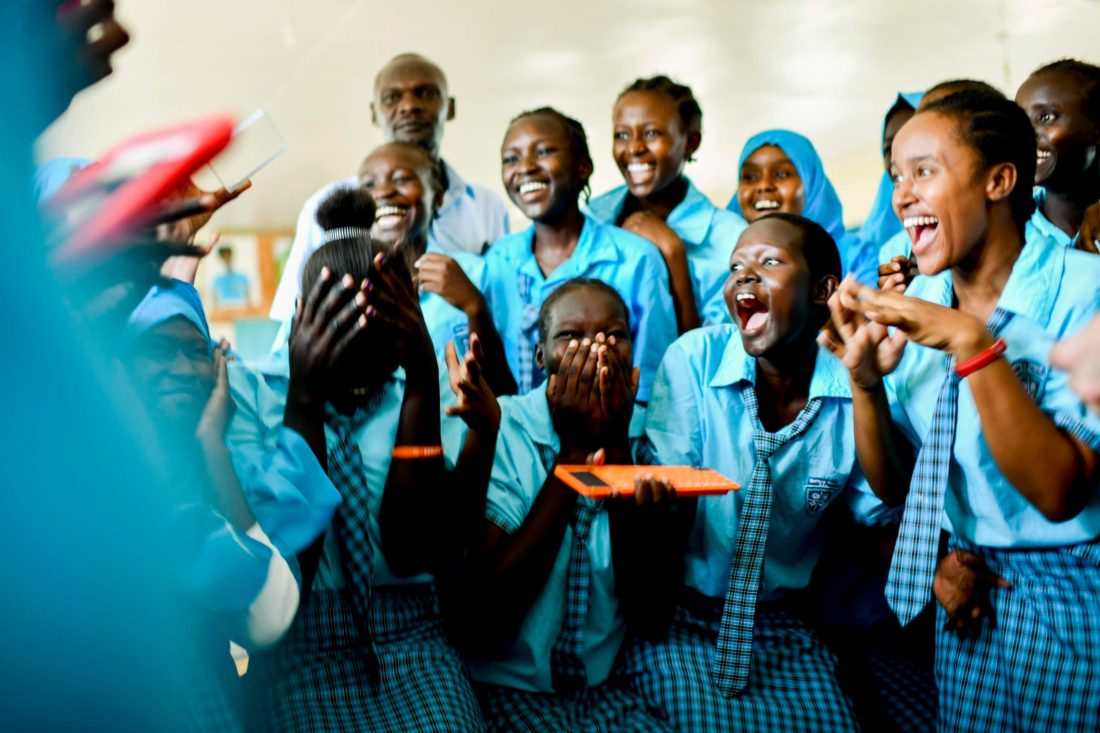I am excited that at the beginning of March I am travelling to the Kakuma refugee camp in Kenya to meet a remarkable group of young women who are part of the iamtheCODE initiative. Here is a quick q and a which explains what they do and what is special about them and their visionary founder.
So who are iamtheCODE and what are their aims?
iamtheCODE is an organisation that aims to teach one million women and girls how to code by 2030. They are also part of an initiative with the World Economic Forum which has unveiled plans to re-skill a billion people by 2030 so they can participate in the fourth industrial revolution. iamtheCODE works particularly with girls who are marginalised in less advantaged parts of the world.
iamtheCODE also partners with organisations and groups that are more advantaged. They have cooperated with a variety of companies including Unilever, UBS, Microsoft, Salesforce, Ali Baba and Ernst & Young. They work in places as diverse as favelas in Brazil to schools in China.
What is the nature of the partnerships? Is it largely companies and organisations offering finance?
The partners have done many things such as hosting boot camps and hackathons. They’ve also given money and provided mentors for the girls, and yes the idea is that longer term, they could offer jobs.
So from the girls’ perspectives, what are the key challenges they face?
A lot of the girls have come from Sudan and have had very challenging pasts. They certainly don’t have the kind of lived experience my kids take for granted. In some ways they’re luckier than others because they’re in Angelina Jolie’s school.
They’ve also got engaged teachers who are interested in making sure they learn. Ultimately though, most of them will never leave that camp, and they know that. So the real challenge is to connect the greater world with these girls who have enormous dreams about who they want to be and how they want to contribute to the world.
How did you end up becoming involved with them, because you’ve got a job title?
I’m so proud to be a champion of iamtheCODE. I originally met Mariéme Jamme, who is the founder and CEO of iamtheCODE in Davos in 2016. My producer Meg Thomson met Mariéme and we had her in for an interview, and her personal story of triumph over extreme adversity that I was drawn into the orbit of this incredible mission. Mariéme was abandoned by her mother, abused by a teacher, and ended up being trafficked from Senegal to Paris. She then managed to escape and learned to code in a library in Britain, picking up English in the library and by watching TV.
She’s a Young Global Leader so she came to Davos so I have interviewed her in Davos every year that she has been there. I also made a podcast about Mariéme and in fact these girls in Kakuma
Why, specifically, are you going to Kakuma now? What’s that story?
I featured these girls in the podcast a year ago and was really moved by some of their words. In particular one of them, Elizabeth said, “it doesn’t matter that I’m a refugee, that’s only a status. It was never written on my face, never written on anything of mine and it is never going to determine my destiny because I’m the one to write my destiny. I will write my own story.”
And I think it would be incredible to find a tangible way to continue to help these girls beyond sharing their stories.

How specifically, are you going to be spending your time in Kakuma?
I’m going to do a workshop on how to speak in public. From what I’ve heard a lot of them are already very good public speakers. So I’m looking forward to working with some of the shier ones – if there are any!
They want to launch their own podcast. So I’m going to help with that as part of their wellbeing club. From what I understand Kakuma refugee camp is, as far as refugee camps go, a hotbed of innovation.
There is a good relationship with the wider Kakuma community. There’s an understanding with the local government which recognises that these folks are here to stay and it would be good to work with them. And a lot of girls in the camp are doing incredible things. There are fashion designers and filmmakers, there are thriving marketplaces. And if some of the girls want to become journalists and tell the stories of Kakuma through a podcast I would be delighted to help that happen.
I’m also going to make at least one podcast about the stories of these girls.
I am also going to spend a day in Nairobi taping some interviews with representatives of Mastercard. They have a financial inclusion office in Nairobi, and they do incredible work in areas like micro retail. So for example, a package of 30 diapers will come in, and because no one can buy 30 diapers at a time, they repackage them so they can be bought one or two at a time. They’re able to tag that micro sale so they know when all 30 have gone at which point the distributor immediately delivers another package.
And how can people in the US and Europe help out iamtheCODE?
Just get in touch with iamtheCODE. Check them out on any form of social media. I think they are going to be starting a crowdfunding campaign soon.
More details are here.